
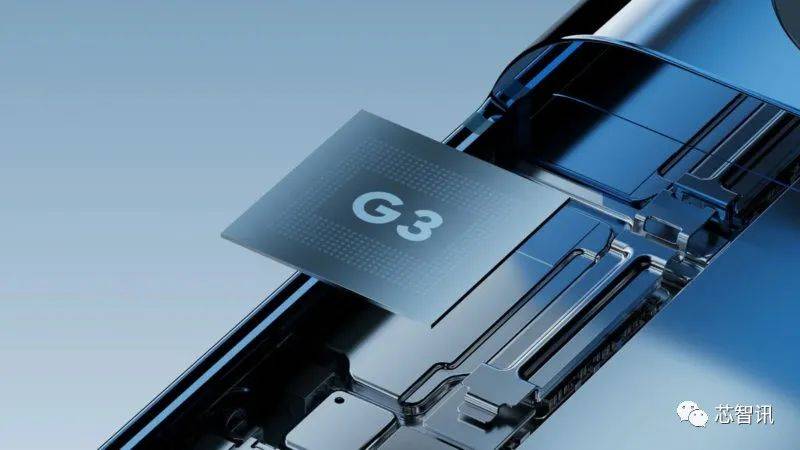
On October 4, Google officially released its latest generation of flagship smartphones Pixel 8 and Pixel 8 Pro. Both phones are powered by Google's latest Tensor G3 processor and will run the latest Android 14 system. Pricing starts at $699. At present, some users have already obtained the new Pixel 8 series phones in advance, and the core parameters and benchmark test results of the Tensor G3 chip have been announced

9-core CPU: Compared with the previous generation, the performance is improved by more than 20%
According to information exposed in the Geekbench database, Google Pixel 8 Pro is equipped with a Tensor G3 processor. The processor is based on a 9-core CPU architecture, including 1 Cortex-X3 large core, clocked at 3.00GHz; 4 Cortex-A715 large cores, clocked at 2.45GHz; 4 Cortex-A510 small cores, clocked at 2.15 GHz. Although these CPU IPs will be launched by Arm in 2022, they have already undergone considerable upgrades compared to the previous generation of Tensor G2
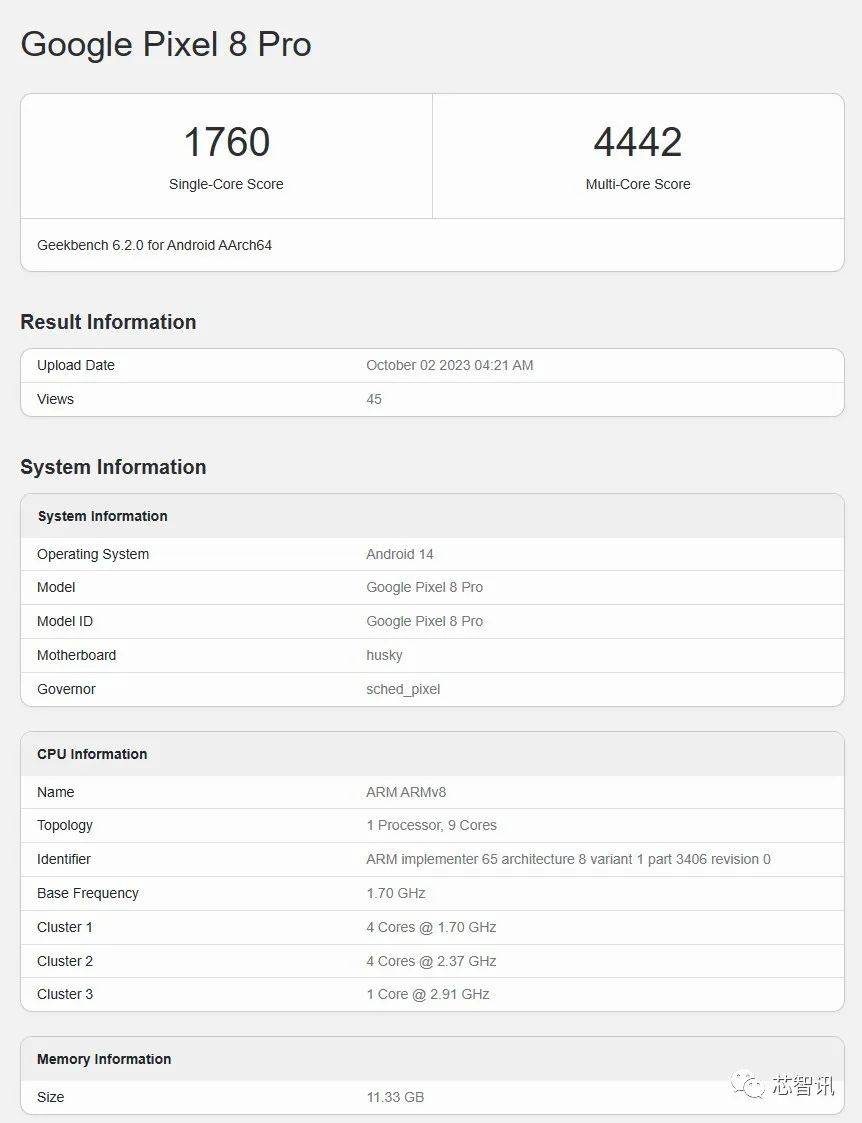
According to the Geekbench 6 running results, the single-core CPU score of Tensor G3 is 1760 points, and the multi-core CPU score is 4442 points. Compared with Tensor G2 (Pixel 7 Pro, single-core 1463 points, multi-core 3498 points), single-core performance has been improved by about 20%, and multi-core performance has been improved by about 27%. However, compared with competing products such as Apple A17 Pro (single-core 2914 points, multi-core 7119 points) and Qualcomm Snapdragon 8 Gen 2, Tensor G3 still lags far behind
10-core Mali-G715 GPU: poor performance stability
The GPU of Tensor G3 uses the 10-core Arm Mali-G715 GPU, which has the same hardware-level ray tracing acceleration capabilities as Apple A17 Pro. In addition, according to previous reports, Tensor G3 will also use the "BigWave" module to further improve video encoding and decoding capabilities. While retaining Tensor G2’s support for AV1 decoding, it also adds AV1 encoding capabilities up to 4K@30FPS. The highest encoding capability of Tensor G3 can reach 8K@30FPS
Recently, netizen @Tech_Reve exposed the results of Pixel 8 and Pixel 8 Pro in 3D Mark’s “Wildlife Stress Test”
According to the "Wildlife Stress Test", we ran a regular 3D graphics scene to continuously test the performance and stability of the GPU for 20 minutes. Factors that affect the results include the process node, GPU, CPU and the device’s cooling system. Pixel 8's best score in the loop test is 8,216 points, and the lowest score is 4,316 points, with very low stability of only 52.5%; while Pixel 8 Pro's best score in the loop test is 8,572 points, and the lowest score is 5,029 points, the stability is slightly better at 58.7%
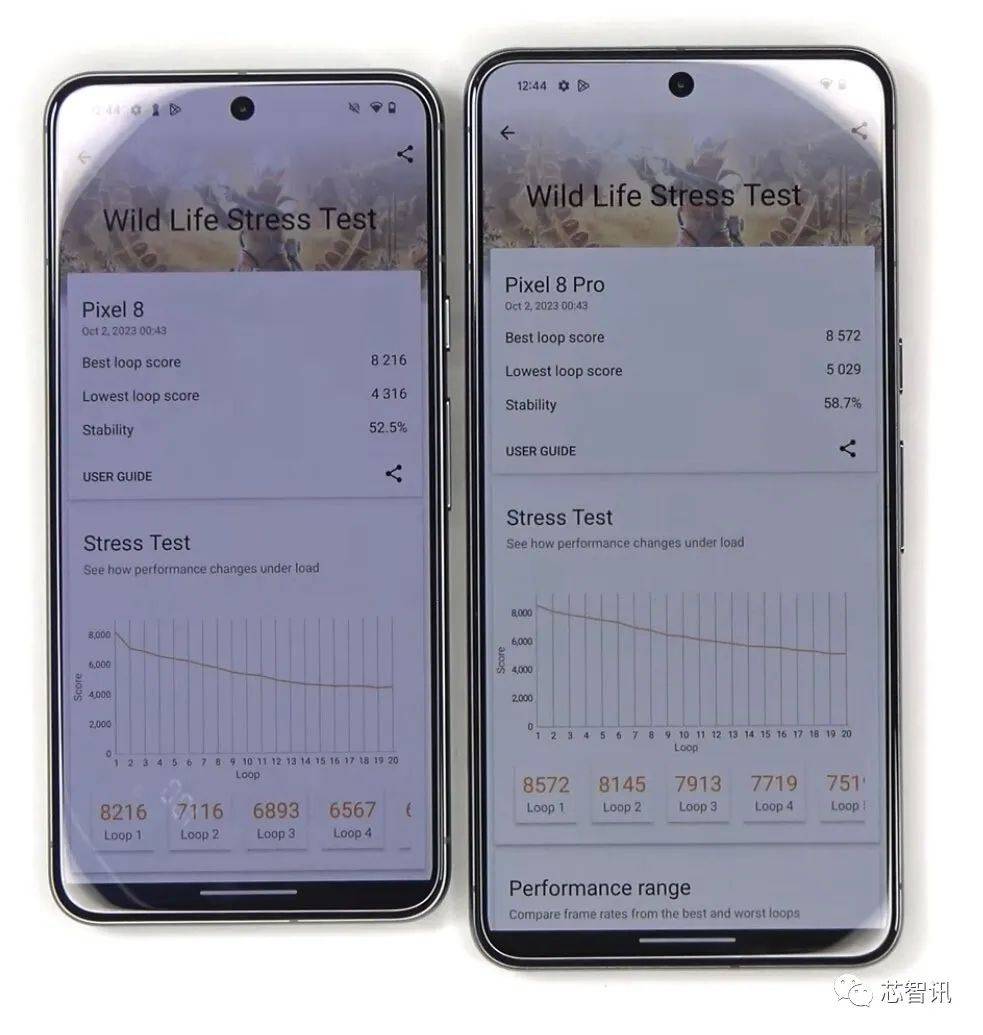
It should be pointed out that although both Pixel 8 and Pixel 8 Pro are equipped with Tensor G3 processors, the regular Pixel 8 is not equipped with a vapor chamber. According to the disassembly of the real Pixel 8 machine, we can see that Google uses copper and graphite films and thermal grease for heat transfer, but this has no obvious effect in alleviating overheating problems. By comparison, the Pixel 8 Pro is equipped with a vapor chamber, which makes its overall performance 11% better than the Pixel 8, even though both phones claim to be powered by the same Tensor G3 processor
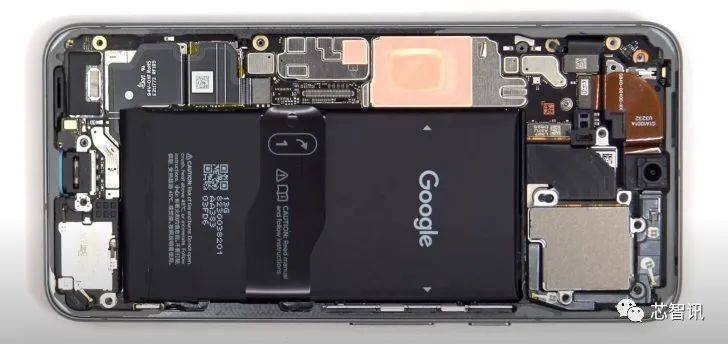
△Google Pixel 8 real phone teardown
This also explains why the Pixel 8 Pro’s GPU performs better. However, the sustained performance of the Pixel 8 Pro's GPU is still not on par with Apple's A17 Pro or Snapdragon 8 Gen 2, and is even lower than the Tensor G2 of the previous generation Pixel 7 Pro.
The performance of the iPhone 15 Pro Max in the "Wildlife Stress Test Stability" was 78.9%-89%, while the stability of the Snapdragon 8 Gen 2 equipped with Xiaomi 13 Ultra reached 89%-100%, while the Pixel The stability of Tensor G2 equipped on 7 Pro is 67.9%-76%
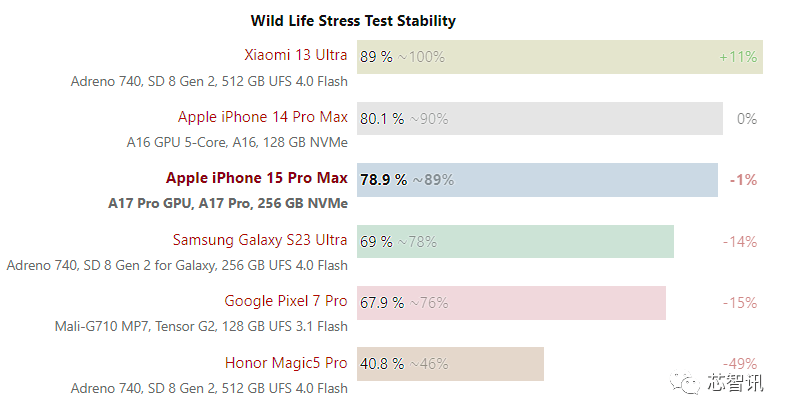
In the more demanding "Wild Life Extreme Stress test" test, the stability of the A17 Pro equipped with the iPhone 15 Pro Max dropped to 65.4%-71%, while the stability of the Snapdragon 8 Gen2 equipped with the Galaxy S23 Ultra The stability has also dropped to 58.7%-64%, and the stability of Tensor G2 equipped on Pixel 7 Pro has increased to 75.6%-82%.
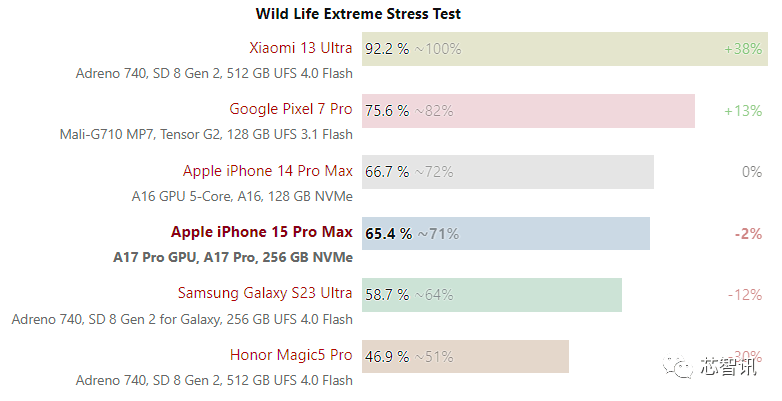
Samsung 4LPP process
Although Samsung announced at the end of June last year that it had mass-produced the 3nm process, no mobile phone chip manufacturer has yet adopted it. Based on the above related tests, Google Tensor G3 is produced based on Samsung’s 4LPP (4nm, Low Power Plus) technology node, not Samsung’s 4LPP+ process.
Previous news showed that Samsung 4LPP+ may be used for Samsung’s own Exynos 2400 chip for the first time, and next year’s Tensor G4 may be produced based on Samsung 4LPP+. Compared with the Samsung 4LPP+ process, the Samsung 4LPP process used by Tensor G3 is less energy efficient.
Although Google has always claimed that the Tensor G series processors are self-developed by it, in fact, this series of SoCs are deeply customized by Samsung LSI department to help Google, and Google provides its self-developed tensor processing unit (TPU) IP, and purchased Arm’s CPU and GPU IP. (For the previous generation Tensor G processor) Samsung provided multi-functional codec IP, custom hybrid ISP, 5G baseband, etc. This is also the main reason why Google’s Tensor G series processors have been manufactured by Samsung, although Samsung’s process has hindered the performance of the Tensor G series processors to a certain extent. In addition, Samsung's foundry prices are more affordable than TSMC's.
Support local running of large AI models
As early as July 2018, Google officially launched edge TPU for edge computing as a complement to its Cloud TPU. At that time, Edge TPU was only used for inference and was designed for running TensorFlow Lite ML models at the edge.
Almost all current mid-to-high-end smartphone processors integrate dedicated AI cores for various artificial intelligence calculations. The Tenso processor developed by Google also has a built-in TPU core developed by Google, but in the driver, Google calls it "edge TPU"
The main goal of Google’s self-developed Tensor G series processors has always been to deeply optimize the collaboration with hardware to better utilize its core software capabilities (including Android system and artificial intelligence capabilities). Especially with the craze of generative artificial intelligence, Tensor G3 has become a key pivot for Google to introduce generative artificial intelligence capabilities on mobile phones
At the Google hardware product launch event, Google announced that the Pixel 8 series will receive multiple onboard generative AI features. This includes an improved version of Magic Eraser photo editing software. In addition, Pixel 8 Pro will get other features such as Video Boost, which uses generative AI processing to improve the quality of mobile videos
For example, Magic Eraser photo editing software allows you to adjust the brightness, background, and even drag the magic photo editing function to change the position of the subject at will.

The effect of the magic photo editing tool is shown below:
Rewritten as: In addition, there is also a photo function that can help users change their expressions with one click. For users of Pixel series phones, they should be familiar with Top Shot’s best photo filtering capabilities. On the basis of the perfect group photo function, for shooting scenes such as faces and group portraits, through the upgrade of Google AI, users can directly select the most perfect expressions and expressions from different frames captured by the camera and replace them

△Perfect co-production function effect display
For Google Pixel series mobile phones, the most obvious improvement brought by the Google Tensor chip may be in video shooting. In Pixel 8 Pro, Google AI continues to play a role, introducing a video enhancer (Video Boost), which can process 4K videos through the HDR pipeline in real time, and also has computational audio functions that identify different sound categories for targeted editing in the future. Support video shooting in night vision mode
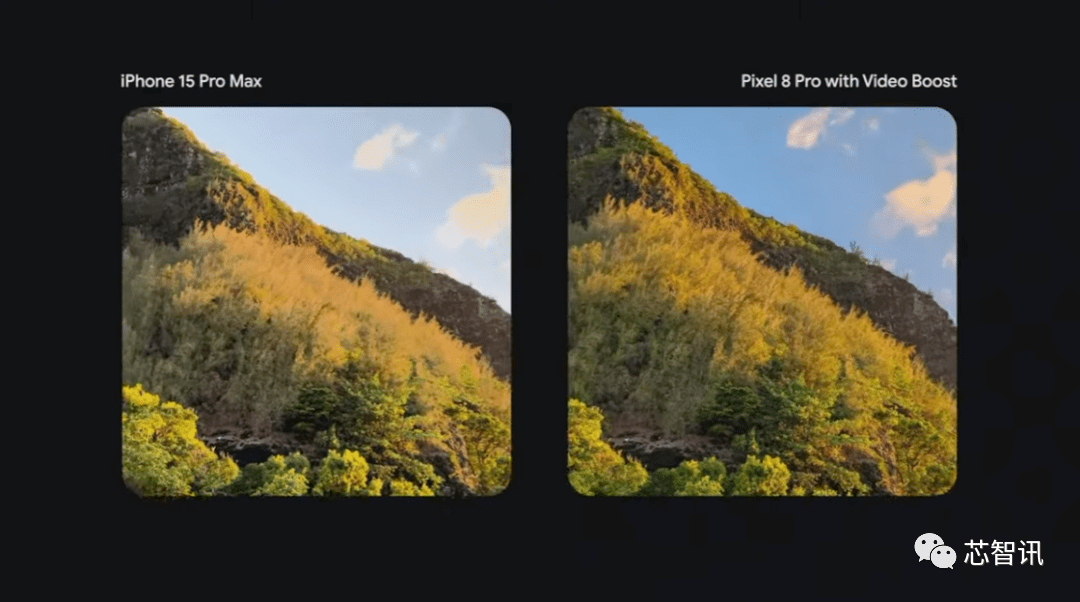
△Comparison of shooting effects between iPhone 15 Pro Max and Pixel 8 Pro after turning on the video enhancer
In addition, Pixel 8 Pro is also the first smartphone to be equipped with Google’s AI basic model. Thanks to the blessing of the AI-oriented Tensor core of the Tensor G3 processor it is equipped with, users can process AI tasks that originally need to be completed through cloud servers locally on their smartphones, with excellent effects and response speed. For example, Pixel 8 Pro can support the magic eraser that can be run offline, which can achieve better object elimination effects based more on image generation rather than blending into the background; Gboard can automatically generate more natural and more consistent communication habits based on conversation information. Reply suggestions allow users to socialize with one click; Pixel 8 Pro even has a built-in model specifically for image processing to generate clearer details for enlarged pictures in the gallery.
It is worth mentioning that MediaTek has previously announced that its new-generation Dimensity flagship mobile chip smartphones support AI applications developed by the Llama 2 model, which can bring users an exciting generative AI application experience.
Re-expressed content is: Summary:
Although Google’s Pixel series of smartphones have always had a low presence, compared to other brands’ flagship smartphones, the Pixel series of smartphones are mainly the first to upgrade to the latest version of the Android system as their biggest selling point. However, with the addition and continuous iteration of the Tensor G series of self-developed mobile phone processors, it has also brought more software and hardware collaboration experience upgrades to the Pixel series of smartphones. For example, Google has introduced its latest AI research results into the new Pixel 8 and Pixel 8 Pro phones, while Tensor G3 deeply combines Google machine learning and AI algorithms to greatly improve its ability to process photos and video recording. Of course, there is still a certain gap between the CPU and GPU performance of the Tensor G series processors and the flagship SoC. This is mainly due to the constraints of chip design and Samsung's process technology.
According to rumors, Google plans to launch the Pixel 10 series of mobile phones in 2025, equipped with a customized Tensor G5 chip. This chip may be produced by TSMC. If so, Tensor G5 may offer a performance experience comparable to Qualcomm or MediaTek’s flagship mobile processors
In order to keep the original meaning unchanged, the content needs to be rewritten into Chinese. There is no need for the original sentence
The above is the detailed content of In-depth analysis of Google Tensor G3 processor: powerful 9-core CPU + 10-core GPU, perfect support for local AI large models!. For more information, please follow other related articles on the PHP Chinese website!
 What drawing software are there?
What drawing software are there?
 Recommended order for learning c++ and c language
Recommended order for learning c++ and c language
 How to withdraw money on WeChat without handling fees
How to withdraw money on WeChat without handling fees
 The performance of microcomputers mainly depends on
The performance of microcomputers mainly depends on
 How to use jsp programming software
How to use jsp programming software
 The Metaverse recognizes the top ten potential coins
The Metaverse recognizes the top ten potential coins
 How to delete a folder in linux
How to delete a folder in linux
 What to do if 302 found
What to do if 302 found
 what is ed
what is ed




